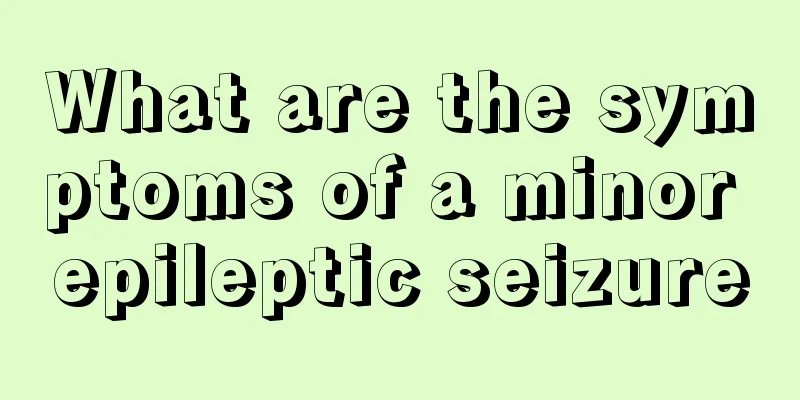What are the symptoms of a minor epileptic seizure

|
A minor epileptic seizure is milder than a major epileptic seizure and the duration of the illness will not exceed half a minute. The typical symptoms are loss of consciousness, loss of consciousness, no convulsions, and no falls. If the disease occurs in children, they may suddenly stop moving their hands. Overview Epilepsy is a disease caused by paroxysmal abnormal discharges of brain neurons due to various reasons, resulting in abnormal movements, sensations, consciousness, mental and autonomic nervous system functions. A minor epileptic seizure is also called a non-convulsive seizure with a non-localized onset, or a global non-convulsive seizure, and is called an absence seizure in the international classification. Absence seizures The child suddenly turns pale while studying or playing Sudden, brief loss of consciousness, lasting no more than 30 seconds, with spontaneous recovery. For example, when the child is studying or playing, his face suddenly turns pale, his eyes stare, he stops the original activities and conversation, something in his hands falls, his head tilts forward, the corners of his mouth and eyelids twitch, and his eyeballs tremble from time to time, but he neither falls nor has convulsions. The frequency ranges from low to high, even several times a day. Experts point out that general intelligence is not affected, but if the attacks occur frequently, it may affect learning. It often occurs between the ages of 5 and 10. Those that occur after the age of 15 are called absence seizures, which are more common in temporal lobe epilepsy. When a patient has a grand mal seizure and the severity of the seizure is alleviated after taking medication, although the patient is only briefly unconscious, it should still be considered a grand mal seizure rather than an absence seizure. Variant petit mal seizures 1. Myoclonic seizures Bilateral rhythmic myoclonic twitches mainly in the muscles of the head and upper limbs may occur singly or repeatedly; the attacks are not accompanied by impaired consciousness and may occur at any time. 2. Akinetic seizures Unable to maintain posture. Sudden bowing of head when standing A sudden, transient loss of muscle tone, resulting in an inability to maintain posture. When standing, the patient suddenly lowers his head, bends his knees, and falls. Sometimes it may occur several times in succession, with a brief loss of consciousness or disturbance of consciousness, followed by immediate awakening. 3. Tonic seizures It manifests as sudden rigid contraction of certain muscles, such as flexion of the trunk, tilting of the head forward, etc., fixed in one posture, which lasts for a period of time, generally not more than 1 minute, accompanied by brief loss of consciousness, and the patient wakes up immediately after the attack. |
<<: Small lumps of flesh grow on the body, the cause is terrible
>>: Know the early symptoms of hepatitis B in advance
Recommend
Is it possible to cure ovarian tumors in the middle and late stages?
Ovarian tumor is a gynecological disease that is ...
How to tell the authenticity of Antelope Cold Capsules?
Antelope Cold Capsules are a very common Chinese ...
What are the common causes of rectal cancer?
Rectal cancer causes great harm to the human body...
Can desiccant be eaten?
In life, we often come into contact with desiccan...
Can nasopharyngeal cancer be cured without surgery?
After diagnosing nasopharyngeal cancer, we need t...
What are the symptoms of male prostate cancer? 4 symptoms of male prostate cancer revealed
Prostate cancer is a type of malignant tumor that...
What are the chemotherapy options for colorectal cancer?
The treatment of colorectal cancer is surgical re...
What exercise can fight ovarian cancer
What kind of exercise can fight ovarian cancer? E...
What are the common problems in the treatment of lung cancer? The three most common problems in the treatment of lung cancer
Cancer has a great impact on our body, but many l...
Hair dryer radiation
When it comes to the radiation from household app...
Can Astragalus and Gynostemma be soaked together?
Astragalus has the effect of enhancing immunity a...
How to remove the smell from a newly decorated house
A newly renovated house contains a lot of formald...
How can I avoid scars on my face
If you get injured on your face, the thing you wo...
The harm of squatting for a long time to defecate
With the popularity of mobile phones and the deve...
Methods for rapid detection of food poisoning
When the hot summer comes, due to the hot weather...









